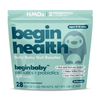How to Support a Healthy Gut in Formula-Fed Babies
share this article

A healthy gut is one of the most important systems to support in the first year of life. For formula-fed babies, this can take some extra care. While breast milk naturally contains components that shape the infant microbiome, formula often lacks some of these key nutrients.
The good news is there are simple, evidence-backed ways to help support a thriving gut, even if your baby is formula-fed.
1. Choose a Formula with HMOs (If You Can)
Human milk oligosaccharides (HMOs) are a powerful group of prebiotics found in breast milk. They help feed beneficial bacteria like Bifidobacterium infantis and promote the growth of a protective, gut-friendly microbiome.
Some formulas now contain HMOs—most commonly 2’-fucosyllactose (2’-FL). Studies show that when added to infant formula, 2’-FL may help support immune function and reduce inflammation, bringing the gut microbiota of formula-fed infants closer to that of breastfed babies [1].
However, many formulas still do not contain HMOs. Even among those that do, the levels may be limited, and they may lack the diversity of oligosaccharides found in breast milk. If your baby’s formula doesn’t list 2’-FL or other HMOs, they may not be getting this critical gut-nourishing ingredient.
2. Add a Prebiotic + Probiotic Supplement for Extra Support
Because many formulas fall short of breast milk’s microbiome-building nutrients, a supplement can be an effective way to help bridge the gap.
A product like Begin Health’s Beginbaby Prebiotic + Probiotics contains both:
-
2’-FL HMO, a key prebiotic shown to promote the growth of beneficial bifidobacteria
-
Clinically studied probiotic strains like Bifidobacterium infantis and Bifidobacterium lactis
This combination, known as a synbiotic, feeds good bacteria and adds beneficial strains to the gut—helping support stool consistency, immune development, and gut balance.
For formula-fed babies without access to the full range of HMOs found in breast milk, this daily supplement can make a meaningful difference in gut health.
Always speak with your pediatrician before introducing a supplement, especially for infants under six months.
3. Track Digestive Clues
Formula-fed babies can have different stool patterns than breastfed babies, but signs of imbalance are often similar. Keep an eye out for:
-
Infrequent or difficult poops
-
Hard or pellet-like stools
-
Excess gas or straining
-
Fussiness after feedings
These may be signs your baby’s gut could benefit from additional support through prebiotics, probiotics, or a change in formula.
4. Create a Gut-Friendly Environment
Supporting gut health is not only about what goes into the bottle. Babies also benefit from:
-
Gentle exposure to household microbes (pets, siblings, outdoor play)
-
Skin-to-skin contact and bonding
-
Calm, predictable feeding routines that support digestion
Early-life microbial exposure in a safe, nurturing environment helps diversify the microbiome and train the immune system [4].
Summary
Formula-fed babies may miss out on key microbiome-supporting nutrients found in breast milk, including HMOs. While some formulas now include 2’-FL, many still don’t. Adding a daily prebiotic and probiotic supplement like Beginbaby Prebiotic + Probiotics can help bridge the gap, supporting gut balance, healthy poops, and immune development.
Combined with a nourishing environment and healthy feeding habits, these small steps can make a big impact on your little one’s gut health.
















